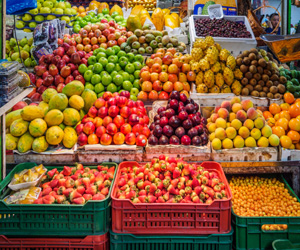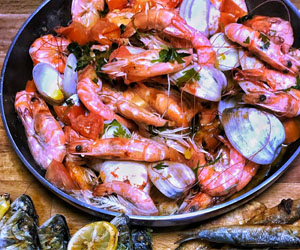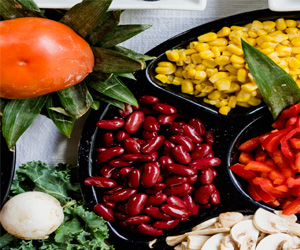


Nourishing The Planet And Ourselves

Food sustainability is a critical global issue that encompasses the responsible production, distribution, and consumption of food in a way that preserves our environment, supports local communities, and ensures a long-term supply of nourishing, safe, and diverse food for everyone on the planet. It's a multifaceted concept that addresses a variety of interconnected challenges.
Environmental Impact: One of the primary aspects of food sustainability is minimizing the environmental impact of food production and distribution. Traditional industrial agriculture has often relied on practices that deplete soil, waste water, and contribute to deforestation. Sustainable agriculture, on the other hand, focuses on regenerative farming methods, crop diversity, and reduced chemical use. It seeks to maintain or improve the health of the land, promote biodiversity, and combat climate change by sequestering carbon.
Local And Seasonal Sourcing: Embracing local and seasonal food is another pillar of food sustainability. The transportation of food over long distances generates a substantial carbon footprint. Choosing local and seasonal ingredients reduces greenhouse gas emissions and supports local economies. It also encourages consumers to connect with the natural rhythms of their environment and enjoy a wider variety of fresh, in-season produce.
Reducing Food Waste: Food sustainability also involves reducing food waste, a significant problem worldwide. By minimizing waste at all stages of the food supply chain, from production to distribution and consumption, we can alleviate the strain on resources and landfills. This requires better planning, innovative packaging, and a shift in consumer behavior.
Healthy Eating: Healthy eating is an integral component of food sustainability. A diet based on nutrient-dense, minimally processed foods contributes to overall well-being and longevity. Sustainable food choices often align with healthier eating patterns, emphasizing fruits, vegetables, whole grains, and lean proteins.
Equity And Social Responsibility: Ensuring food sustainability includes addressing social equity and responsibility. It's about fair labor practices, food access for all, and the elimination of hunger. Sustainable food systems aim to reduce disparities and provide access to nutritious, affordable food for everyone, irrespective of their socio-economic status.
Consumer Awareness: Raising consumer awareness is crucial for the success of food sustainability initiatives. When consumers understand the impact of their food choices on the environment, local communities, and their own health, they are more likely to make informed decisions that align with sustainability goals.
Government And Industry Involvement: Government policies and industry practices play a vital role in promoting food sustainability. Subsidies, regulations, and incentives can either support or hinder sustainable farming and food distribution. Encouraging sustainable practices at the industry level can have a profound impact on the sustainability of our food systems.
Food sustainability is more than just a buzzword; it's a moral and ecological imperative. It's a blueprint for a future where we can nourish ourselves without harming the planet and its resources. To achieve a sustainable food system, we must collectively commit to supporting environmentally friendly, community-based, and equitable approaches to food production and consumption. By making mindful choices and advocating for change, we can help create a world where food not only nourishes our bodies but also the planet and society as a whole.
 3. Slow Cooking: Slow cooking is a hallmark of Mediterranean cuisine. Stews and braised dishes are prepared with patience and love, allowing flavors to meld together harmoniously. Iconic dishes like Italian Osso Buco, Greek stifado, and Moroccan tagine exemplify the art of slow cooking.
3. Slow Cooking: Slow cooking is a hallmark of Mediterranean cuisine. Stews and braised dishes are prepared with patience and love, allowing flavors to meld together harmoniously. Iconic dishes like Italian Osso Buco, Greek stifado, and Moroccan tagine exemplify the art of slow cooking.
4. Seasoning With Fresh Herbs: Mediterranean cooking methods emphasize the use of fresh herbs like basil, oregano, thyme, and rosemary. These herbs not only infuse dishes with an aromatic depth but also contribute to the health benefits of the Mediterranean diet.
Nourishing Your Body One Sip At A Time
 Antioxidant Benefits
Antioxidant Benefits
Antioxidants are nature's superheroes when it comes to fighting off free radicals and preventing cellular damage. Nutrient-packed beverages frequently contain an abundance of antioxidants sourced from fruits, vegetables, and other plant-based ingredients. These antioxidants help protect our bodies from oxidative stress and reduce the risk of chronic diseases.
Weight Management And Digestive Health
Nutrient-packed beverages can be a valuable tool for those looking to manage their weight. A well-balanced smoothie or juice can provide satiety while keeping calories in check. Additionally, they often include dietary fiber, which supports healthy digestion and promotes a feeling of fullness.
From Uncertainty To Culinary Confidence
 Exploring And Experimenting: As kitchen novices grow in confidence, they naturally gravitate towards exploration and experimentation. Trying out new recipes and different cooking methods becomes an exciting adventure. There's a sense of wonder in discovering how ingredients interact and how flavors meld together. The kitchen evolves from a place of intimidation to one of creative expression.
Exploring And Experimenting: As kitchen novices grow in confidence, they naturally gravitate towards exploration and experimentation. Trying out new recipes and different cooking methods becomes an exciting adventure. There's a sense of wonder in discovering how ingredients interact and how flavors meld together. The kitchen evolves from a place of intimidation to one of creative expression.
Building Culinary Confidence: Culinary confidence is a gradual byproduct of this journey. It's the point where kitchen novices realize that they have not only acquired skills but also developed a passion for cooking. The satisfaction of preparing a delicious meal or mastering a challenging dish is immensely rewarding. Kitchen novices begin to relish the act of cooking and take pride in serving their culinary creations.
Culinary Evolution: The beauty of being a kitchen novice is that it's a phase that eventually gives way to culinary expertise. Novices become more skilled, more daring, and more passionate about cooking. The once-daunting kitchen becomes a realm of comfort and creativity.
The Delight Of Wholesome Recipes
 Nutrient-Rich Ingredients: Wholesome recipes are characterized by their reliance on nutrient-rich ingredients. Fresh fruits and vegetables, lean proteins, whole grains, and heart-healthy fats take center stage. These ingredients are packed with essential vitamins, minerals, and antioxidants that support our health and well-being.
Nutrient-Rich Ingredients: Wholesome recipes are characterized by their reliance on nutrient-rich ingredients. Fresh fruits and vegetables, lean proteins, whole grains, and heart-healthy fats take center stage. These ingredients are packed with essential vitamins, minerals, and antioxidants that support our health and well-being.
Balanced Nutrition: One of the key features of wholesome recipes is their focus on balanced nutrition. These recipes aim to provide a harmonious blend of macronutrients and micronutrients, ensuring that our bodies receive the fuel they need to function optimally. The balanced approach contributes to sustained energy levels and better overall health.
Simplicity And Freshness: Wholesome recipes embrace the beauty of simplicity. They rely on the natural flavors and textures of ingredients without overcomplicating dishes with excessive additives or processed foods. This simplicity not only makes the recipes easier to prepare but also allows the purity of each ingredient to shine through.




The Art Of Satisfying Palates
 The Culinary Playground: The kitchen is a canvas, and tasty creations are the masterpieces. It's a space where culinary artists, from amateur home cooks to seasoned professionals, experiment with flavors, ingredients, and techniques to craft dishes that tantalize the taste buds and ignite the senses. Tasty creations are the result of imagination, innovation, and the passion for food.
The Culinary Playground: The kitchen is a canvas, and tasty creations are the masterpieces. It's a space where culinary artists, from amateur home cooks to seasoned professionals, experiment with flavors, ingredients, and techniques to craft dishes that tantalize the taste buds and ignite the senses. Tasty creations are the result of imagination, innovation, and the passion for food.
Flavorful Alchemy: At the heart of tasty creations lies the art of flavor alchemy. It's about understanding how different ingredients interact, the balance between sweet and savory, the harmony of contrasting textures, and the science behind seasoning. Each dish is a testament to the chef's ability to combine these elements in a way that surprises and delights.
Cultural Fusion: Tasty creations often draw inspiration from diverse culinary traditions. Exploring flavors from around the world adds a dimension of cultural fusion to these creations. The ability to blend the spices of India with the noodles of Thailand, or the cheeses of France with the bread of Italy, creates a global palate that is both exciting and delectable.